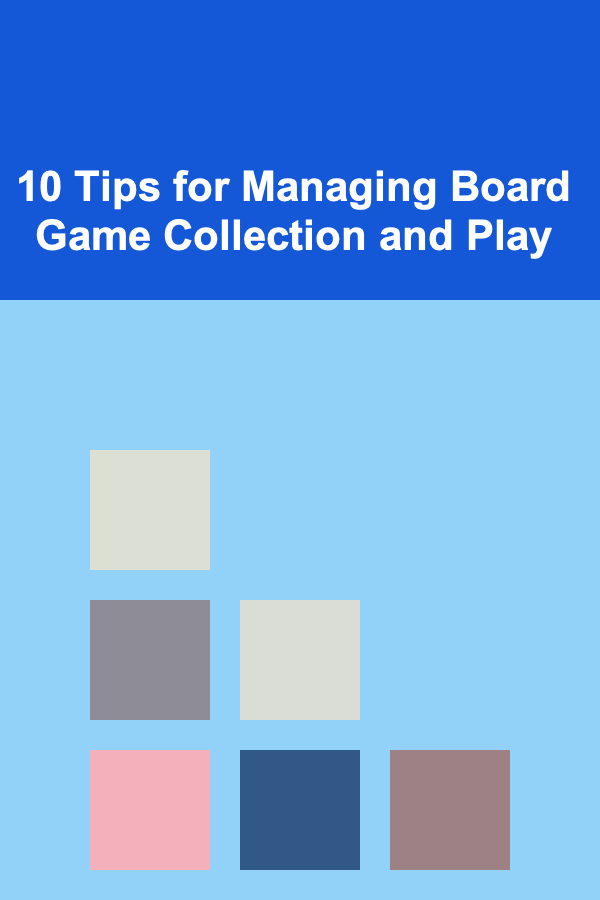
10 Tips for Managing Board Game Collection and Play
ebook include PDF & Audio bundle (Micro Guide)
$12.99$5.99
Limited Time Offer! Order within the next:

Board games have always been a great way to bond with friends, family, and even strangers. With the rise of tabletop gaming over the last few decades, board games have moved beyond traditional titles like Monopoly and Scrabble, expanding into an incredibly diverse and intricate world. Whether you're an avid board game enthusiast, a casual player, or just someone interested in getting into the hobby, managing a board game collection and organizing regular gameplay sessions can be a daunting task. As your collection grows, it can become difficult to keep everything in order, let alone find the time and space to enjoy it.
In this article, we'll discuss 10 essential tips to effectively manage your board game collection and make your gaming sessions as enjoyable as possible. These tips will help you make the most of your time, space, and budget, all while ensuring that your board game experience is smooth and fun.
Organize Your Collection by Category or Theme
As your board game collection grows, organizing your games becomes crucial to ensure you can find the ones you want to play quickly. A disorganized collection can make the process of choosing a game tedious and frustrating. One way to organize your games is by categorizing them into specific themes or types. For example:
- Strategy games : These require careful planning and critical thinking. Popular examples include Catan , Ticket to Ride , and Carcassonne.
- Party games : These are usually easy to learn and fun for larger groups. Examples are Codenames , Telestrations , and Pictionary.
- Cooperative games : Games where players work together to achieve a common goal, like Pandemic , Forbidden Island , and Spirit Island.
- Family-friendly games : These are games suitable for all ages and skill levels, such as Uno , Monopoly , or Dixit.
- Two-player games: If you often play with a partner, organizing a separate section for games designed for two players can save you time.
You can also consider organizing games by the number of players, playtime, or difficulty level. Once categorized, you can easily navigate through your collection, pick something suited for your group, and avoid wasting time shuffling through boxes.
Tip: Use clear labels or color-coded shelf dividers to separate categories visually. You can also maintain a digital inventory list that reflects these categories.
Create a Storage System for Easy Access
The way you store your games can greatly affect how easily you can access them when it's time to play. Board game boxes, especially larger ones, can be cumbersome and awkward to store, leading to potential damage. A good storage solution should both preserve the integrity of your games and make them easy to access.
Here are a few options to consider:
- Vertical shelving: Store your games upright, like books on a bookshelf. This allows you to easily see the boxes, making it simple to grab the game you want. It also helps protect the boxes from being damaged, as they aren't piled on top of each other.
- Game bags or containers : For smaller games, consider using clear plastic containers or game bags to store the components. This can be especially helpful for games with a lot of small pieces, like Jenga or Azul. Labeling each bag will keep things organized.
- Under-bed storage: If you're limited on space, consider using under-bed storage containers. This hidden space can be perfect for storing a large number of games without cluttering the room.
- Specialized game storage: Invest in board game organizers like Kallax units, which are designed specifically to hold board games. They often come with adjustable shelves that fit a wide variety of game sizes.
Tip: Always store your board games in a cool, dry place to prevent warping or moisture damage. Avoid stacking too many games on top of one another to keep the boxes from getting squashed.
Use a Digital Catalog for Your Collection
As your collection expands, it can become increasingly difficult to remember exactly what you own, which can lead to duplicate purchases or, worse, missing games that you've forgotten about. Creating a digital catalog is a simple solution to this problem.
There are various ways to catalog your board game collection:
- Spreadsheet: Use a spreadsheet to list your games. Include details like the name of the game, the publisher, the number of players, and the time required to play. You can also add notes about what type of game it is (strategy, cooperative, etc.).
- Board game apps : Several apps, such as BGG (Board Game Geek) or Gameboard, allow you to catalog your collection digitally. These apps often offer features like searching for a game by its category, user reviews, and the ability to track games you've played.
- Photo catalog: If you prefer a visual approach, take photos of the game covers and organize them in a digital album, either on your phone or in the cloud. This is a quick way to browse your collection and identify games you own.
Tip: Make it a habit to update your catalog whenever you acquire or sell a game. This ensures your list remains accurate and helps you keep track of your collection over time.
Implement a Regular Play Schedule
While it's great to own a collection of games, it's even better to play them. A regular play schedule can help ensure you get the most enjoyment from your games. Establishing a routine will not only give you something to look forward to but also help you explore your entire collection.
You can create a play schedule based on your preferences:
- Weekly game nights: Set aside one or two nights each week for playing board games with friends, family, or a gaming group. Rotate through your collection to keep things fresh.
- Themed play sessions: Pick a theme for a week (e.g., cooperative games, or games with specific mechanics like worker placement) and play through all the games in that category.
- Special events: Organize events for special occasions or holidays. For example, a Halloween party could feature spooky-themed games, while a New Year's Eve gathering could include social party games.
Tip: If you have a large collection, focus on playing games that are more in-depth once a month and lighter, easier-to-play games in between. This balance keeps the excitement alive without overwhelming yourself with complex games every time.
Try to Play Each Game at Least Once a Year
As your collection grows, it becomes easy to forget about games you haven't played in a while. To prevent games from collecting dust on the shelf, aim to play each game in your collection at least once a year. This will give you the opportunity to refresh your memory on the rules, rekindle your enthusiasm for older games, and keep your collection diverse.
You don't have to play every game with every session, but setting a goal of playing each game once during the year ensures that you're keeping your entire collection engaged.
Tip: Keep a simple log or calendar to track which games you've played and when. This will help you avoid neglecting any of your favorites.
Be Selective with New Acquisitions
One of the most common problems that board game collectors face is buying too many games, which can quickly lead to clutter and a lack of time to enjoy each one. While it's tempting to buy the latest and greatest game, consider being more selective with your acquisitions.
Here are a few questions to ask yourself before purchasing a new game:
- Do I have the time to play it? Games that require lengthy setups or long play times might only get played occasionally.
- Will I enjoy it? Think about your gaming preferences. If you're not a fan of deck-building games, it might be better to skip the latest release in that category.
- Can I see myself playing it regularly? Consider whether the game fits well into your regular gaming schedule or if it will just gather dust on the shelf.
- What's the price? It's easy to get carried away with deals, but make sure the game is worth the investment based on its replayability and enjoyment.
Tip: Avoid impulse buying. Do some research, read reviews, and watch gameplay videos before making a decision to ensure the game is right for you.
Host a Board Game Swap or Sale
If your collection has grown too large or you find yourself rarely playing certain games, consider organizing a board game swap or sale. These events can help you downsize your collection while also introducing you to new games that others might no longer want.
Hosting a board game swap allows you to:
- Trade games: Swap games you no longer play for ones you're interested in.
- Sell unused games: If you prefer to make space (and money), you can sell games that are taking up space but no longer bring you joy.
- Meet other gamers: Board game swaps are also a great opportunity to meet new people who share your interests.
Tip: Check your local board game stores, gaming conventions, or online marketplaces to see if there are organized board game sales or swaps happening in your area.
Maintain the Integrity of Your Games
As your collection grows, it's important to take care of your games so they last for many years. Board games are an investment, and maintaining their condition can preserve both their value and your enjoyment.
Here are a few tips for maintaining your games:
- Use game inserts: Many games come with inserts to help keep components organized. If a game doesn't have one, you can purchase custom organizers to prevent components from getting lost or damaged.
- Store components properly: For games with small pieces (cards, tokens, dice), consider using small bags or containers to prevent damage or loss. This also makes setup easier.
- Handle with care : Treat game pieces, cards, and boards gently to avoid wear and tear. Use card sleeves for games that involve shuffling cards, such as Dominion or Terraforming Mars.
Tip: Invest in a game repair kit, which includes glue for broken pieces, replacement parts, and protective sleeves for cards.
Play with Different Groups
Variety is the spice of life, and the same goes for board games. Playing with different people can give you a new perspective on the game and its mechanics. Some games that might feel repetitive with your usual group can feel fresh when played with new players who bring a different strategy or style of play.
If you're in a gaming group, consider switching up the composition regularly. Alternatively, invite family, friends, or even online opponents to introduce new dynamics into your gaming experience.
Tip: Attend board game meetups or conventions to find people who are passionate about the hobby and might introduce you to new games or play styles.
Enjoy the Process, Not Just the Result
Finally, remember that board games are about fun and connection. While it's great to have a perfectly organized collection and play regularly, the ultimate goal is to enjoy the time spent playing with others. Whether you win or lose, the experience of shared laughter, challenges, and victories is what makes board games special.
Focus on the process of learning new games, experiencing different play styles, and celebrating the time spent with friends and family rather than just the outcome of each session.
Tip: Try to maintain a balance between competitive and casual gaming. Even if you're playing a highly strategic game, don't forget to have fun and enjoy the company you're with.
Reading More From Our Other Websites
- [Personal Investment 101] How to Use Peer-to-Peer Lending to Achieve Your Financial Goals
- [Organization Tip 101] How to Use Journaling to Track Your DIY Progress
- [Organization Tip 101] How to Optimize Your Workspace with Smart Technology
- [Organization Tip 101] How to Create a Budget for Your Family Reunion
- [Home Lighting 101] How to Use RGB Lighting to Enhance Your Gaming Setup or Home Theater
- [Home Storage Solution 101] How to Store Your Luggage in Small Apartments
- [Home Cleaning 101] How to Clean Your Air Vents and Improve Air Quality
- [Hiking with Kids Tip 101] From Forests to Waterfalls: The Best Kid-Safe Hikes Across the U.S.
- [Skydiving Tip 101] Advanced Techniques for Speed-Packing Your Parachute in Competitive Jumps
- [Personal Finance Management 101] How to Use a Budget App to Track Spending Effectively

How to Add Personal Touches to Your Home Party Decor
Read More
How to Choose the Right Safe for Your Home
Read More
How to Create an Emergency Kit for Your Pets
Read More
How to Perform Regular Electrical Inspections to Prevent Hazards
Read More
How to Plan a Poolside Party at Home for Summer Fun
Read More
How to Save Money on Home Tech and Smart Devices
Read MoreOther Products

How to Add Personal Touches to Your Home Party Decor
Read More
How to Choose the Right Safe for Your Home
Read More
How to Create an Emergency Kit for Your Pets
Read More
How to Perform Regular Electrical Inspections to Prevent Hazards
Read More
How to Plan a Poolside Party at Home for Summer Fun
Read More